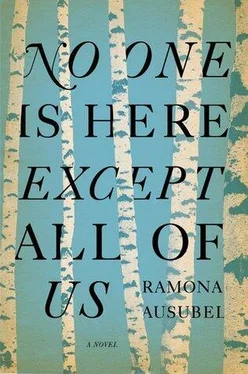Before the small group of villagers who had survived dove into the river, they looked at one another. They were all strangers who had known one another a long time ago. Oh, hello, they thought. You look so familiar to me. I think we were friends when we were children. Didn’t I used to pick cabbages? Weren’t you my wife? I think I might love you. They let themselves fall, and the surface of the earth was liquid, and they could pass through it. The people gasped with the shock of the water’s cold; it felt like coming home.
The water was moving fast, and my people, all of them strangers and all of them family, were carried away.
Ahead of the others in the tumbling water, each of Hersh’s and Kayla’s pumping organs pumped hard. Like the men before, they had crushed what had fallen in their path. The mud had slapped their feet. They had parted the grass like a curtain and passed through it. The rain got in their eyes as they rounded the corner to the river. They had jumped into the cold, rushing water. They took each other’s hands and Kayla held on to a reed to keep them still. The water chewed them with its cold teeth, made all their short hairs stand and their skin harden.
They looked back at the barn and could see the dark ink of movement inside. They could hear as well as they had ever been able to hear in their lives: the begging and screaming was needle sharp. The river was another kind of music, rain falling softly into it. Kayla and Hersh listened to the melody of the two sounds together.
“The real stars,” Kayla said, looking up.
“We will have to let go,” Hersh said. “They will eventually find us here.”
Kayla’s shoes fell off, one and then the other. They rushed away.
“My shoes are gone,” she told her husband.
Hersh reached down to untie his but did not remove them, he let the river do the removing. Their skin was numb now, just a casing for their insides.
Their socks stayed a few moments and then snaked themselves off, slithered away. Kayla’s dress was heavy on her shoulders. She turned to Hersh and without her asking him to, he unbuttoned it and they waited while it slipped down the length of her body. It surfaced, a white bubble, which they watched until it turned the corner. She was in her underwear now, the weedy, soft grass fanning against her skin.
“I am not a young woman anymore,” Kayla said.
“I am not a young man.”
“I never swam well. We should have gone to the woods.”
“We do not need to swim. We only need to float,” Hersh said.
“Let me take the weight of your clothes away so you are a lighter boat,” she said while she unbuttoned his vest, his black woolen vest, and then his white shirt. He put one arm out at a time while she held the other and his clothing was caught in the current and slipped away.
They took turns holding the strong reeds and each other while they removed the last of the cloth. Their skin, loose now after all the years of hanging on to their bones, flapped softly.
“It was a nice place to raise our daughter,” Hersh whispered.
“She’s fine,” Kayla said. “Someplace in the world, our daughter is fine.”
“We have passed ourselves along,” Hersh told his wife. His face was white with moon and cold.
“We couldn’t have done anything to help the others,” Kayla said.
“No one could have done anything.”
“I’m happy we finished the sky.”
“Do you remember the beginning of the world?” Hersh asked. “What a lucky time to have been alive.”
“I wish it hadn’t gone so fast. Here we are, old and swimming away.”
“But I’m glad we’re old and swimming away together,” Hersh said, and he laid his cold lips on her forehead.
On the bank, in the tangle of dark willows, something small scratched in the branches. Something else slapped at the water. In the distance, Hersh and Kayla could hear the march of hundreds of feet. The entire earth rumbled under the migration. They could see the black line of the villagers leaving the village.
“The river is cold.”
“Should we be getting on?” he asked.
Kayla let go of the reeds. The two of them began their bobbing journey. Their naked bodies floated to the top of the water and they put their heads back and held their breath. Their fingers were twisted together.
They did not say the names of the constellations out loud but they knew them all. The sky was a cloth with enough holes to breathe through.
After a long time, Hersh said, “Tell me you’re here.”
Kayla made a small and caught noise.
“Say your name,” he told her.
She made the same small and caught noise.
“My name is Hersh,” he said. “I am yours.”
He floated with her cold hand for a long time. The river turned and turned back. The banks narrowed and the water grew faster, then the banks widened out and he could hardly feel the water’s movement.
“I’m yours,” Hersh said again to his floating bride but she did not answer him with a squeeze of her fingers or a word.
“You’re mine,” he said, and he opened his fingers up and let her go.
Kayla whirled in an eddy. He closed his eyes even though the darkness was already a sheet over everything. “I’m yours,” he said again, and kicked against the drift, trying to stay close. He gave her a final push, sent her coasting toward the edge. “Bring good luck to the riverbanks.”
The weeds would be the ones to catch Kayla, the long arms of the willows taking her close. They would spiral around each of her parts. They would grow into her, under and through. Short green leaves would not be far behind.
Hersh floated away under the shameless beauty of the heavens. “Let the waters swarm with swarms of living creatures, and let fowl fly above the earth in the open firmament of heaven,” he said to himself, remembering when he had read the passage as a young man and the idea that life could be invented had seemed like a fairy tale. Now, floating alone in the river, far away from the known world, he was hopeful that someone had thought to conjure up places downstream from here. “Let there be a village not far away,” Hersh said quietly to the night. The stars winked back, as if to prove they heard him. “And let those villagers be out on the bank gathering glinting fish from a flood,” he said. “And let them be there when a stranger washes up on their shores, and let the villagers wrap him in wool blankets and take him home where a new world waits. And let there be someone, somewhere, to tell his story. Our story.”
THE BOOK OF THE SEA AND THE FUTURE, WHICH IS NOW
Igor slept alone in the windowless dark of his cell. For the first time he wanted to punch the walls out himself. For the first time the cage made him feel kept. For the first time he did not sleep well in his four-poster bed, even with his legs spread wide, his arms out and the blanket pulled up to his chin.
“I’m by the ocean!” he yelled, and the walls sent his words back. “I don’t know where that is!” He stood up and jumped on the bed. He sprang up high and yelled, “I’m a prisoner in a foreign land!” He jumped and he called, “I have a wife and two sons someplace!” He landed, bent his knees and flew again. “I have everything I need! Where is it all?”
Later, Francesco took Igor by the arm and walked the scrabbled path to the post office. The letter went addressed to Lena, My Wife, Zalischik . Igor touched the envelope to his cheek before handing it over.
“A swim?” Francesco asked.
“I’ll come and sit on the rocks and watch you. I will be waiting for my wife to write back.”
“It will take weeks, I think.”
“Then I’ll write another one.”
Читать дальше












